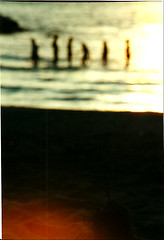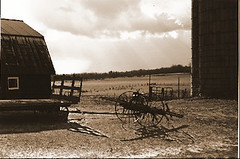Psycho (1960)
Dir. Alfred Hitchcock
Writ. Joseph Stefano, based on the novel by Robert Bloch
w/ Anthony Perkins, Janet Leigh, Vera Miles, and Martin Balsam
"Sometimes Saturday night is a lonely sound. Ever notice that, Lila?"
A shower's one of the few places a girl's supposed to be able to let down her hair. Every frame in Hitchcock's timeless thinkpiece tautly shoulders the next, building the suspense and binding the story together in the most logical succession of scenes. Very few horror movies contain surer, more deliberate construction, even among the master's best. Like other technical directors (Stanley Kubrick) he busied himself with the minutiae of the art form to an imperative degree.
When an actor, feeling snubbed or ignored or generally unable to grasp his character, asked Alfred about his motivation the reply invariably was, "You're getting paid. That's your motivation." Some directors like to keep their players on edge for optimal results.
Dozens of takes finally perfected the famous shower montage sequence. The final shot of Marion's body lying on the bathroom floor required Janet Leigh to lay perfectly still in the nude while Alfred got it right. The resulting death shot plays the centripetal role, resonating on many levels as the quiet eye of the storm. There aren't, you see, a lot of extras in the film. Neither does the script suffer from any excesses of dialogue or action.
When Marion leaves town with money stolen from her employer her motivation is thin but clear. She exits an affair with an unavailable man and an unexciting job. Not a lot of character gets developed, but her choice makes some sense, as does her growing nervousness. She sees her boss on the crosswalk at a red light hours after absconding with the bank deposit and takes off. A policeman notices her car alongside the highway and she responds to him irrationally, not thinking clearly enough to get away from him easily. This leads to her trading in her automobile and taking an obscure stretch of road by accident in the rain. Like a wild animal driven into a trap by blind panranoia, she arrives at the Bates Motel where she meets the charming, boyish proprieter, Norman Bates.
A prime example of a parasitic upbringing, Norman immediately feels guilt over spending time with the pleasant, new lodger; it isn't, however, until Marion presents a threat to his dubious state of mind that his mood darkens, and it's possible that had she not tried to sympathize with him concerning his daunting mother that he wouldn't have felt the need to kill Marion. No one can ever come between Norman and his mother, and no bloodletting can ever rid him of the effects of her constant, insidious abuse. Of course, he puts her in cabin number one where he can keep a close eye on her anyway, and we are left to wonder if her fate hadn't already been sealed.
The similarities between these two characters strikes a chilling chord, bringing the story into focus and tossing them together in a down-to-earth light in a discussion of private traps. In Marion's case, she'd like to be free. She'd like to be rid of the $40,000 barrier she uncovered in Phoenix, where she'd been working for ten years in a trustworthy position with security. Norman, intent on never leaving the maudlin darkness which has held him in limbo for the same span of years, can not let her leave. Suggestive symmetry begets the suspiscion that, although their crimes differ in type and degree, there is little else that separates these two potential mental cases.
But for conscious choice, that is. Marion had made up her mind to leave the Bates Motel and set the record straight. Norman did not.















1 Comments:
SPOILER: There is a rumor that the this film was not passed for release because it was claimed that Janet Leigh's nipple was visible during the shower scene. The nipple wasn't in the film at all, but the cinematography and score are so well performed here, it caused the release board originally to think that there was a nipple visible and send the film back for re-editing. The production team went through the shower sequence cut by cut to illustrate that there was not. Alfred Hitchcock made no changes (none were needed), but merely sent it back, assuming that they either wouldn't bother to watch it, or would realize their mistake.
Buy Discount DVD Movies, Cheap DVDs, Buy DVDs Online
Post a Comment
<< Home